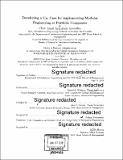| dc.contributor.advisor | Daniel E. Whitney and John F. Carrier. | en_US |
| dc.contributor.author | Arámbula González, Chen Josué | en_US |
| dc.contributor.other | Leaders for Global Operations Program. | en_US |
| dc.date.accessioned | 2018-09-17T15:52:15Z | |
| dc.date.available | 2018-09-17T15:52:15Z | |
| dc.date.copyright | 2018 | en_US |
| dc.date.issued | 2018 | en_US |
| dc.identifier.uri | http://hdl.handle.net/1721.1/117975 | |
| dc.description | Thesis: M.B.A., Massachusetts Institute of Technology, Sloan School of Management, in conjunction with the Leaders for Global Operations Program at MIT, 2018. | en_US |
| dc.description | Thesis: S.M., Massachusetts Institute of Technology, Department of Mechanical Engineering, in conjunction with the Leaders for Global Operations Program at MIT, 2018. | en_US |
| dc.description | Cataloged from PDF version of thesis. | en_US |
| dc.description | Includes bibliographical references (page 103). | en_US |
| dc.description.abstract | Modular engineering allows the creation of a product architecture that prepares the product families of companies for a fast response to changes in technology and customer demand. This thesis will focus on developing and proposing a methodology for implementing modular engineering at AIP's portfolio companies and ensure that the implementation is replicable in any other of its companies. AIP companies are from very diverse industries and offer multiple heterogeneous products. The proposed methodology will make it possible to target companies and products that are good candidates for the implementation of modularity from the standpoint of cost benefit. One AIP portfolio company is currently implementing modular engineering. This project was the base for creating a use case. This thesis explores the methodology used by the portfolio company for designing a modular architecture and proposes an automated approach using machine learning techniques. This will allow a faster creation and evaluation of the modular architecture. In addition, the modular project benefits are: fewer unique part numbers, less assembly time, lower direct purchasing costs, fewer suppliers, faster time to market, shorter lead-time and more market offerings. The bottom line benefit is a streamlined operation that would add value to the company. Finally, this thesis summarizes the lessons learned of the modular engineering implementation to serve as a guide for future implementations on portfolio companies. | en_US |
| dc.description.statementofresponsibility | by Chen Josué Arámbula González. | en_US |
| dc.format.extent | 103 pages | en_US |
| dc.language.iso | eng | en_US |
| dc.publisher | Massachusetts Institute of Technology | en_US |
| dc.rights | MIT theses are protected by copyright. They may be viewed, downloaded, or printed from this source but further reproduction or distribution in any format is prohibited without written permission. | en_US |
| dc.rights.uri | http://dspace.mit.edu/handle/1721.1/7582 | en_US |
| dc.subject | Sloan School of Management. | en_US |
| dc.subject | Mechanical Engineering. | en_US |
| dc.subject | Leaders for Global Operations Program. | en_US |
| dc.title | Developing a use case for implementing modular engineering at portfolio companies | en_US |
| dc.type | Thesis | en_US |
| dc.description.degree | M.B.A. | en_US |
| dc.description.degree | S.M. | en_US |
| dc.contributor.department | Leaders for Global Operations Program at MIT | en_US |
| dc.contributor.department | Massachusetts Institute of Technology. Department of Mechanical Engineering | |
| dc.contributor.department | Sloan School of Management | |
| dc.identifier.oclc | 1051238256 | en_US |
